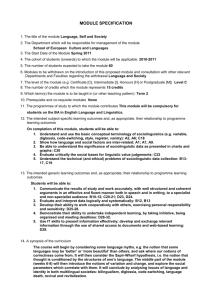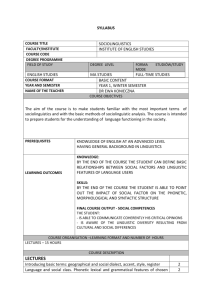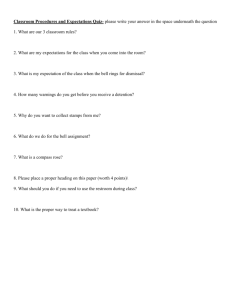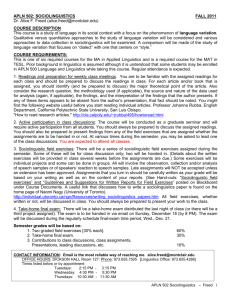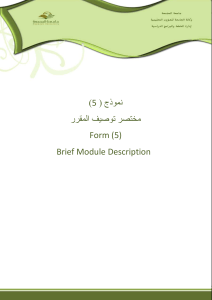Sociolinguistics
advertisement
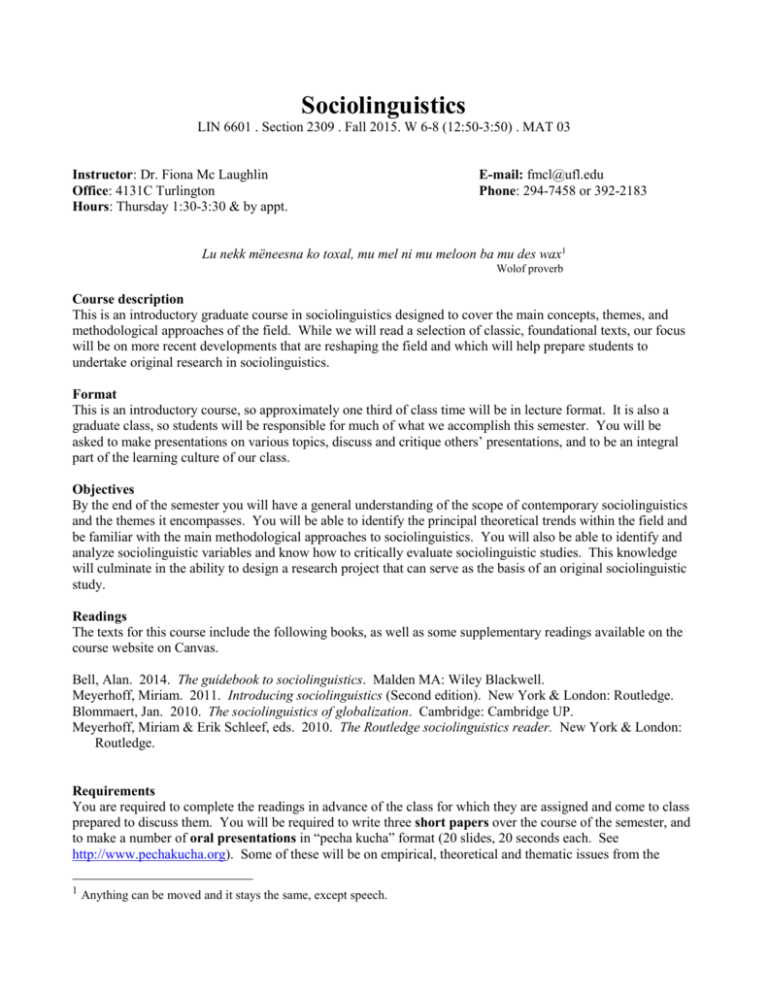
Sociolinguistics LIN 6601 . Section 2309 . Fall 2015. W 6-8 (12:50-3:50) . MAT 03 Instructor: Dr. Fiona Mc Laughlin Office: 4131C Turlington Hours: Thursday 1:30-3:30 & by appt. E-mail: fmcl@ufl.edu Phone: 294-7458 or 392-2183 Lu nekk mëneesna ko toxal, mu mel ni mu meloon ba mu des wax1 Wolof proverb Course description This is an introductory graduate course in sociolinguistics designed to cover the main concepts, themes, and methodological approaches of the field. While we will read a selection of classic, foundational texts, our focus will be on more recent developments that are reshaping the field and which will help prepare students to undertake original research in sociolinguistics. Format This is an introductory course, so approximately one third of class time will be in lecture format. It is also a graduate class, so students will be responsible for much of what we accomplish this semester. You will be asked to make presentations on various topics, discuss and critique others’ presentations, and to be an integral part of the learning culture of our class. Objectives By the end of the semester you will have a general understanding of the scope of contemporary sociolinguistics and the themes it encompasses. You will be able to identify the principal theoretical trends within the field and be familiar with the main methodological approaches to sociolinguistics. You will also be able to identify and analyze sociolinguistic variables and know how to critically evaluate sociolinguistic studies. This knowledge will culminate in the ability to design a research project that can serve as the basis of an original sociolinguistic study. Readings The texts for this course include the following books, as well as some supplementary readings available on the course website on Canvas. Bell, Alan. 2014. The guidebook to sociolinguistics. Malden MA: Wiley Blackwell. Meyerhoff, Miriam. 2011. Introducing sociolinguistics (Second edition). New York & London: Routledge. Blommaert, Jan. 2010. The sociolinguistics of globalization. Cambridge: Cambridge UP. Meyerhoff, Miriam & Erik Schleef, eds. 2010. The Routledge sociolinguistics reader. New York & London: Routledge. Requirements You are required to complete the readings in advance of the class for which they are assigned and come to class prepared to discuss them. You will be required to write three short papers over the course of the semester, and to make a number of oral presentations in “pecha kucha” format (20 slides, 20 seconds each. See http://www.pechakucha.org). Some of these will be on empirical, theoretical and thematic issues from the 1 Anything can be moved and it stays the same, except speech. assigned readings, while others will be on readings that inform your own research. There will be a mid-term (or just after mid-term) take home exam, and your semester’s work will culminate in an original research design, suitable as the basis for an original sociolinguistic study, which you will present to the class at the end of the semester. Grades Grades will be calculated on the following basis: Short papers 20% Pecha kucha presentations 20% Mid-term exam 20% Class discussion 10% Research project design + presentation 30% Academic (dis)honesty Academic dishonesty, including cheating or collaborating on exams and plagiarism, will not be tolerated. Any student engaging in such activities will be dealt with in accordance with University policy and receive a failing grade for the course (www.dso.ufl.edu/judicial/procedures/academicguide.php) It is your responsibility to understand what constitutes plagiarism. If you have any questions about it, please consult the professor. Students with disabilities If you have a disability that may affect your performance in this class, you should contact the Dean of Students Office (www.dso.ufl.edu/drp/) and let me know in any way that you are comfortable with so that I can make arrangements to accommodate you. SCHEDULE (subject to change according to class needs) Week 1 (August 26): Introduction to the field of sociolinguistics Readings: Bell Ch. 1, Meyerhoff Ch. 1 Week 2 (September 2): Multilingualism: the natural state of things Readings: Bell Ch. 2, Meyerhoff Ch. 6 Assignment: Short paper on multilingualism (due September 11) Week 3 (September 9): No class (I will be participating in the British Academy Conference on African Multilingualism http://www.britac.ac.uk/events/2015/African_Multilingualism.cfm) and will fill you in on it when I get back! Week 4 (September 16): Language shift and maintenance Readings: Bell Ch. 3 Week 5 (September 23): Language birth and death Readings: Bell Ch. 4 Week 6 (September 30): Borrowing, codeswitching, code-mixing: asking the right questions Readings: Bell Ch. 5; Meyerhoff Ch. 6 Assignment: Short paper on language contact (due October 5) 2 Week 7 (October 7): Language and society, language in society Readings: Bell Ch. 6 Blommaert, Jan. 2008. The sociolinguistics of globalization. Cambridge: Cambridge UP (selections) Week 8 (October 14): Introduction to variationist sociolinguistics Readings: Bell Ch. 7; Meyerhoff Ch. 2 & 3 Assignment: Short paper on variationism (due October 19) Week 9 (October 21): Language over time Readings: Bell Ch. 8, Meyerhoff Ch. 7 & 8 Take-home mid-term exam (Due October 28) Week 10 (October 28): Language in space Readings: Bell Ch. 9 Blommaert, Jan. 2008. The sociolinguistics of globalization. Cambridge: Cambridge UP (selections) Pennycook, Alastair 2010. Language as a local practice. Routledge (selections) Week 11 (November 4): Language ideology Readings: Bell Ch. 10 Week 13 (November 18) Identity Readings: Bell Ch. 11 Week 14 (December 2) Research design presentations & feedback Week 15 (December 9) Research design presentations & feedback 3
